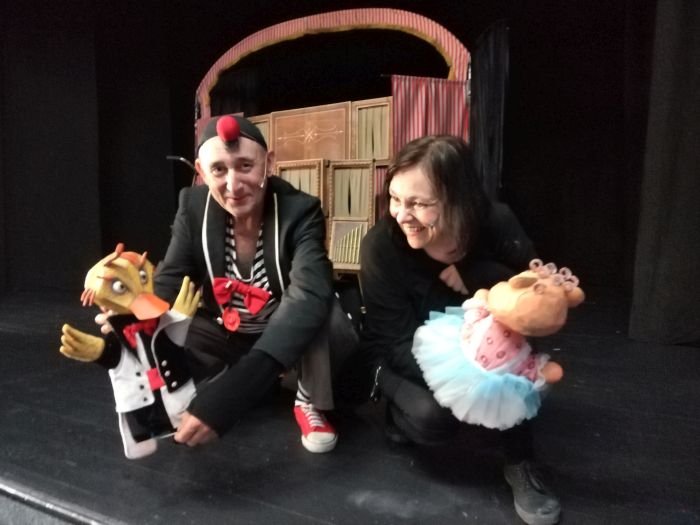Hristo The Elephant - an equilibrist, with a charming clown and his troupe, which consisted of muscles, ballerinas, ducks and some other puppets, greatly entertained the youngest audience of the Novi Sad Theater Festival. Their parents and all the guests of the Festival enjoyed the play, too. Well done to the skilled and charming Bulgarian puppeteers Rozika and Georgi Spasov who enticed scores of smiles and applause throughout the show with their inspired play.
For the theater in general, responsibility towards the audience is important, and what kind of responsibility do you need to have when you are an actor for children, a puppeteer?
Georgi Spasov: An actor must absolutely and constantly be aware of that responsibility. My teacher used to say – to play for children should be done the same way as for adults, only with more responsibly and even better.
Today, it is very difficult for the theater to be more imaginative than the sensations offered to children by phones, the Internet and various other gadgets. How can theater deal with that?
G S: I don't think that mobile phones and all modern technology can displace the theater from our lives. I would quote a playwright who says that even if there were two people left on earth, one would make theater and the other would watch.
Today we saw two big children in you two. How to protect that child in a grown man in a time that is not kind to anyone?
G S: I think it is individual. Some people keep the child inside them, some don't. In any case, our profession, and the fact that we work for children, helps us to maintain and keep the child in us.
You played in Bulgarian and there were fears whether the children would understand a lot of the text you spoke, but the enchanting play overcame the language barrier. Were you afraid of what it would look like?
G S: There was a language barrier, but it is always a question of desire and will to overcome it, both on the part of the actors and the audience. The more the actors give and find a way to convey and perform better, the more that barrier disappears. This mutual will is important.
Is it harder to be visible or invisible on stage? You, Rozika, were invisible during the whole performance, and yet, your performance thrilled the audience.
Rozika Spasova: Well, it is more difficult to be invisible, because the actor has contact with the audience, and the invisible one does not. I can't see the audience, but I have to make contact with the children. The puppeteer does not have direct contact with the audience, but through the puppet and it is the reverse process, because through the puppet they cannot receive the feeling and energy that the audience gives to the puppet, and everything is therefore much more complicated than when the actor feels it live.
When you got the idea for this play, did you write a script, a text, make a construction of how everything would look, or did you build this clown story piece by piece?
Rozika Spasova: We didn't have any script, just the idea to work with the famous Bulgarian director, unfortunately the late Peter Pashov, to build a story, and then we included other collaborators in the story, with whom we created the play together. Little by little, what we see today was formed.




